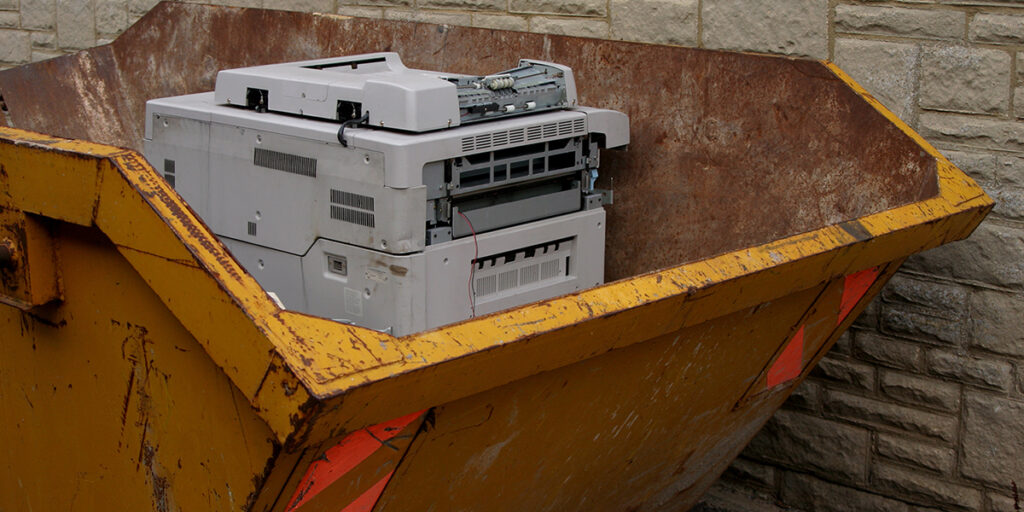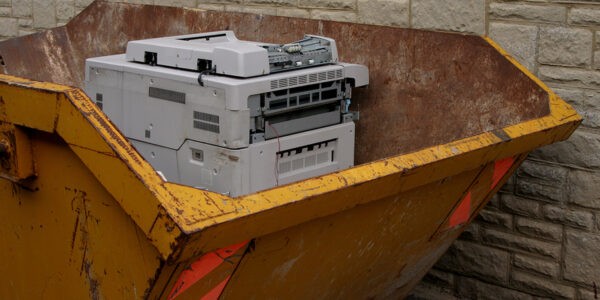
Credit: itcopiers.com
Introduction
As technology advances, electronic waste (e-waste) has become a growing concern for businesses and the environment. One common item contributing to e-waste in offices is the photocopier. When it comes to copier disposal, it’s essential to follow proper procedures to minimize the negative impact on the environment and ensure compliance with state and federal regulations. In this article, we’ll explore the best ways to dispose of your old copier responsibly.
How Do You Dispose of Photocopiers?
When disposing of a photocopier, you have several options. The first step is to consider whether the machine can be reused or recycled. If the copier still works, consider donating it to a charity or a non-profit organization. Many charities are happy to accept used electronics, including printers and copiers.
If the copier is broken or outdated, it’s time to recycle it. Many companies specialize in copier recycling and disposal. These companies will remove your old copier and transport it to a recycling center to be processed and recycled. Recycling the copier helps reduce the environmental impact of e-waste and conserves natural resources.
How Do You Dispose of Printers in the UK?
The UK has strict regulations regarding the disposal of electronic waste. When it comes to printer disposal, you can recycle your old printer through a registered waste carrier or bring it to a designated recycling center.
What Kind of Hazard is Photocopiers?
Copiers contain potentially hazardous materials such as lead, cadmium, and toxic chemicals. When these materials are not disposed of properly, they can pose a risk to human health and the environment. For this reason, it’s important to handle copier disposal with care.
What Environmental Considerations Should Be Taken Into Account When Disposing of a Copier?
When disposing of a copier, it’s important to consider the environmental impact of e-waste. Copiers and other electronics contain valuable materials that can be reused, such as copper, gold, and silver. By recycling your copier, you can help reduce the need for new materials and conserve natural resources.
Are There Any Legal Regulations or Requirements for Copier Disposal?
Yes, there are state and federal regulations regarding the disposal of electronic waste, including copiers. These regulations are in place to protect the environment and ensure that hazardous materials are disposed of properly. Failure to comply with these regulations can result in fines and other penalties.
What Are the Potential Risks or Hazards Associated with Improper Copier Disposal?
Improper copier disposal can result in serious environmental and health risks. When copiers are disposed of in landfills, toxic materials can seep into the soil and arrive contaminate groundwater. Burning copiers can release toxic fumes into the air, which can be harmful to human health. It’s essential to handle copier disposal with care to minimize these risks.
Definition of the Problem of Copier Disposal and Its Waste
Copier disposal is a growing problem, as businesses and individuals continue to replace old copiers with new models. The waste generated by copiers and other electronics contributes to the growing problem of e-waste, which can have serious environmental and health impacts.
The Necessity of Efficient Disposal to Mitigate the Negative Impact on the Environment
Efficient copier disposal is essential to minimize the negative impact of e-waste on the environment. By recycling copiers and other electronics, we can reduce the need for new materials and conserve natural resources. It’s important to dispose of copiers properly to ensure compliance appointment with state and federal regulations and protect the environment.
The Significance of Adopting Sustainable Practices in the Realm of Copier Disposal
Adopting sustainable practices in the realm of copier disposal is essential to minimize the impact of e-waste on the environment and human health. By recycling copiers and other electronics, we can conserve natural resources and reduce the need for new materials. It’s important to adopt sustainable practices in the workplace to protect the environment and promote a more sustainable future.
Copier Disposal: Why You Should Recycle Your Old Machine

Credit: by Kimberly Paynter / Youtube
When it’s time to upgrade your office equipment, disposing of your old copier might not be the first thing on your mind. However, it’s important to properly dispose of your old machine, and recycling is the best option.
- Firstly, copiers contain a variety of materials that can be harmful to the environment if not disposed of properly. This includes toxic chemicals, heavy metals, business, and plastics. By recycling your old copier, disposal process you can ensure that these materials are disposed of safely and responsibly. Here you can find out best metal recycling methods and how to make money by using them.
- Secondly, recycling your old copier can also benefit your department or client. Many organizations offer copier recycling programs that allow you to donate your old machine fine to someone in need. This can be a great way to give back to your community and help those who might not have access to the latest office technology.
When it comes to recycling your old copier, there are a few things to keep in mind.
- First, you should never simply throw your old machine in the trash or send it to the junkyard. Copiers should be recycled properly to ensure that the toxic materials inside are not released into the environment.
- Second, you should make sure to remove any personal information from the copier’s hard drive before recycling it. This includes any stored e-waste collection documents or data, as well as any login credentials that may be stored on the machine. You wouldn’t want your personal information to fall into the wrong hands.
- Finally, you should consider recycling other electronic equipment at the same time. This might include your computer, monitor, or other office equipment. Many organizations offer electronic recycling programs that can help you safely dispose of these items as well.
In conclusion, when it’s time to upgrade your office equipment, don’t forget about the need to recycle your old copier. By doing so, you can help protect the environment, benefit your department or client, and ensure that your personal information remains secure. Recycle your old copier today – it’s the right thing to do.
The Importance of Proper Copier Disposal
When it comes to disposing of old office equipment, such as copiers, it’s important to do so in an environmentally responsible manner. Not only is it better for the planet removal, improperly but it can also have legal implications if not done properly.
One common mistake made by many organizations is simply estimate throwing away old copiers in the trash. However, copiers often contain hazardous materials such as toner and chemicals that can be harmful if not disposed of correctly. This can lead to potential fines or legal trouble if the organization is found to violate environmental regulations.
So, what is the proper way to dispose of an old copier? The answer is to recycle it. Many digital companies offer copier recycling programs that will properly destroy and dispose of the copier and recycle any parts that can be reused. This not only ensures that chance the copier affordable is disposed of in an environmentally responsible way, but it also helps to reduce the amount of electronic waste that ends up in landfills.
It’s also important location to note that copiers aren’t the only office equipment that needs to be recycled shouldn’t. Retailer important Old computers, environmentally friendly monitors, and other proper disposal electronic devices can also contain hazardous materials and need to be recycled properly. You’re IT department should have a plan in place for disposing of old equipment, and if they don’t, it’s important to encourage them to create one.
In conclusion, when it comes to copier disposal, it’s important to do so in a responsible form of e-waste and environmentally-friendly way bin. Simply throwing old copier printing in the trash is not only harmful to the planet but obsolete it can also have legal implications. Instead, of recycling old, organizations should make use of copier recycling programs to ensure that their old equipment is disposal and recycling is properly recycled. And remember client’s, this not only unwanted electronic applies to copiers, and e-waste recycling but to all electronic junk that needs to be disposed of. Let’s all do our part to protect the environment and recycle our old electronics properly.
Tips
- Select a professional copier recycling and disposal company to handle your old copier.
- Don’t want to recycle your old copier it’s never? Consider donating it to a charity or non-profit organization.
- Be sure to wipe the hard drive on your copier’s unwanted office before disposing get rid of it to protect sensitive data.
- It’s important to remove any sensitive data that may be stored drop-off on the copier’s hard drive. This can be done best way by wiping the hard drive or physically destroying it. You also need to ensure that the copier is transported to the recycling facility securely to prevent any damage or theft.
- Selling printers can be a pain at times, but it’s a good way to offset the cost of purchasing a new printer.
Warnings
- Improper copier disposal can result in serious environmental and health risks to consumers.
- Failure marketing to comply with state manufacturers and federal regulations nationwide regarding electronic waste disposal can device result in fines and other penalties.
- Office electronics like copy machines shouldn’t be disposed of in a landfill.
Conclusion
In conclusion, copier disposal is an important issue that businesses office copies, and individuals must address to minimize the impact of e-waste on the environment law. Company like by recycling copiers and other electronics, we can reduce the need for new materials and conserve natural resources. It’s essential to handle copier disposal with care to protect the environment and comply with state and federal regulations. By doing so, you’ll not only be protecting the environment but also making a positive impact on our planet.

